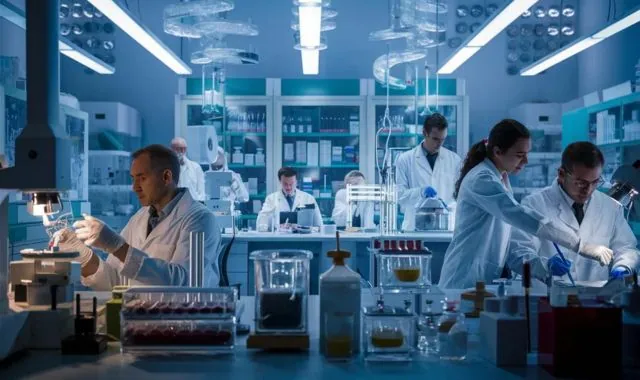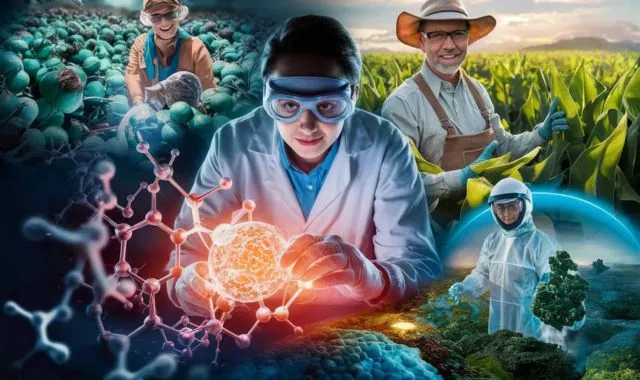Physical Address
304 North Cardinal St.
Dorchester Center, MA 02124
Physical Address
304 North Cardinal St.
Dorchester Center, MA 02124

Biotechnology revolutionizes various fields like healthcare, agriculture, and industry. From medicine production to engineering crops, it offers solutions to global challenges. Ethical considerations and open communication are crucial for responsible development of this powerful technology that holds immense promise for a brighter future.

Biotechnology: a term that conjures images of gleaming laboratories and cutting-edge research. But the truth is, this science has been quietly shaping our world for millennia. From the ancient art of fermentation to the development of life-saving medicines, biotechnology weaves a fascinating narrative that continues to evolve at an astonishing pace.
Biotechnology’s roots run deep. From using yeast to make bread to harnessing bacteria for cheese production, ancient civilizations unknowingly employed its principles. Today, however, biotechnology leverages the power of modern tools like genetic engineering and cellular manipulation to create groundbreaking advancements in healthcare, agriculture, and industry.
At its core, biotechnology revolves around harnessing the potential of living organisms – from microscopic bacteria to complex plants and animals. By understanding their biological processes and manipulating them for specific purposes, scientists can develop solutions to some of humanity’s most pressing challenges.
Biotechnology’s applications are as diverse as life itself. Here, we delve into some of its most significant areas of impact:
Biotechnology is revolutionizing healthcare by offering a powerful arsenal of tools for:
Biotechnological tools are enabling earlier and more accurate diagnosis of diseases, leading to better treatment outcomes. From genetic testing for inherited conditions to rapid infection detection kits, these advancements are saving lives.
Biotechnology is creating a new era of targeted therapies. From life-saving insulin for diabetics to monoclonal antibodies for cancer treatment, these innovations offer hope for patients with previously untreatable conditions.
This revolutionary field aims to treat diseases by correcting faulty genes. While still in its early stages, gene therapy holds immense promise for curing genetic disorders and even some forms of cancer.
Biotechnology is transforming agriculture by developing:
Crops are being engineered to resist pests, diseases, and harsh environmental conditions, leading to increased yields and food security.
Biotechnology is developing drought-resistant crops and nitrogen-fixing plants, contributing to sustainable food production for a growing global population.
Biotechnology’s reach extends to industry as well, with applications in:
Biofuels derived from plant materials offer a clean and sustainable alternative to fossil fuels.
Microorganisms are being harnessed to break down pollutants and clean up environmental messes, offering a natural solution to a pressing problem.

As with any powerful technology, biotechnology comes with its own set of ethical considerations:
The debate surrounding genetically modified organisms (GMOs) rages on. While proponents tout their benefits for food security and nutrition, concerns exist regarding potential environmental and health risks.
The possibility of using gene editing to create “designer babies” raises profound ethical questions about manipulating the human genome.
Open dialogue and public education are crucial for navigating the ethical complexities of biotechnology. Scientists, policymakers, and the public must work together to ensure responsible development and use of these technologies.
Biotechnology continues to push boundaries, offering a glimpse into a future filled with possibilities:
Imagine a future where medical treatments are customized based on your individual genetic makeup, maximizing effectiveness and minimizing side effects.
Biotechnology holds the promise of regenerative medicine, where damaged tissues can be repaired or even replaced using stem cells and other innovative techniques.
The field of biofabrication is exploring the possibility of 3D-printing human organs for transplant, potentially eliminating the waitlist for organ donors.

Biotechnology presents a powerful force for good, offering solutions to some of humanity’s most pressing challenges. By fostering open communication, ethical considerations, and responsible research, we can harness the immense potential of this science to create a healthier, more sustainable, and brighter future for all. The journey ahead is one of continuous learning, responsible innovation, and collaboration. As we embrace the wonders of biotechnology, let us ensure it serves the betterment of humanity and the planet we call home.
Biotechnology is a broad field with numerous sub-disciplines. Some of the major areas include:
This involves manipulating genes to create new organisms or products.
A specific type of recombinant DNA technology that focuses on altering the genetic makeup of an organism.
This field uses computer science and mathematics to analyze biological data.
This involves using living organisms or their components to create products on an industrial scale.
Biotechnology applications are rigorously tested for safety before being introduced to the market. However, as with any new technology, there are potential risks that need to be carefully considered. Open communication and ongoing research are crucial for ensuring the safe and responsible use of biotechnology.
Some ethical concerns surrounding biotechnology include:
Biotechnology is a rapidly evolving field with immense potential. Some exciting future directions include:
There are many resources available to learn more about biotechnology. Here are a few suggestions: